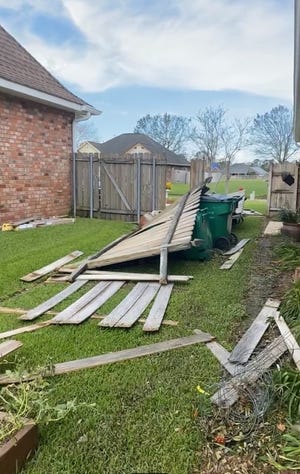12.22.21 – Daily Advertiser – Cadem Lim, Joe Kehrli, Logan Puissegur and Alexander Sobel LSU Manship School News
Every morning, Floyd Dupre and his son, Mike, button up their denim shirts, throw on some jeans and slip into their boots. It’s another day on the farm tending to their cattle.
Meanwhile, 60 miles east in the state’s capital, Floyd’s grandson and Mike’s nephew Joseph Dupre hits the gym near his apartment and heads to class at the state-of-the-art engineering building on LSU’s campus.
Joey Dupre is a chemical engineering student who wants to focus on sustainable energy sources. He aspires to live in Houston rather than take over his grandfather’s farm, and his story is typical for rural Louisiana, where younger generations are leaving for more opportunities in urban areas and other states.
Data from the 2020 U.S. Census shows that 45 of Louisiana’s 64 parishes lost population over the last decade. Louisiana was fifth in the nation for slowest population growth; the only parishes that saw growth were the main urban ones and their suburbs.
Louisiana’s population grew a mere 2.7%, according to Census data. The national average was 7.4%.
Towns in some of the swampland parishes closer to the Gulf of Mexico that rely on the petroleum industry are experiencing a similar loss as the country shifts to more renewable energy sources and storms intensify.
New Iberia residents say, for instance, that their area has been losing people to Lafayette and more distant places as oil-related business declines at its port.
“Out of the six of us, my siblings and my cousins, that could choose where they wanted to live, only one of them lives in New Iberia,” Warner Simon, an LSU student from there, said. “Three of them live in New Orleans, one in Houston and one in Tampa Bay.”

Governor John Bel Edwards formed a task force in early 2020 to recommend solutions to the challenges that rural communities are facing. The task force returned last June with four key recommendations: expanding broadband, improving infrastructure, expanding workforce training and higher education opportunities, and expanding agriculture centers at the state’s university systems.
The state Legislature created grants this year to help rural communities with broadband access. Louisiana expects to receive more than $6 billion from a giant federal infrastructure bill. The money will be used to upgrade drinking water systems, especially in rural parishes, and improve roads and ports.
But while the spending may help, it is not likely to change the long-standing generational shifts that have left rural communities across the country feeling older and less vibrant.
Leaving farms and the bayous
Floyd Dupre started working on his father’s farm as a young boy and inherited 800 acres after his father died. One a recent day, Floyd, now 72, made his daily drive down Texas Eastern Road at 10 mph in his Chevrolet Silverado, observing each pasture with dozens of cows serenely grazing.
Mike, being younger and more able-bodied, operated the tractor as he tended to the cattle, plowed fields and repaired old fences.
Floyd is about to hand the entire farm to Mike, who is the only one of his siblings to stay on the farm.
“The roots were sunk, and I just jumped on board,” Mike Dupre said.
Both said the last thing they would want is to move away from Opelousas and experience life in a big city. Mike said that in cities, you’re just a number; in small towns, you’re a name and a person.
“I’m not sure how I could live in a place where I’d be back-to-back with my neighbor,” Floyd said. “I love my lifestyle. It’s a very simple one, but I wouldn’t want to have anything else.”
Mike understands why younger family members do not want to work on the farm.
“It’s a lot of work for little reward,” he said.
Shelbi Ourso, who lives in Pierre Part, a bayou town between Baton Rouge and Morgan City, said a staunch divide between generations contributes to the population decline in rural areas.
In Pierre Part, most in the older generations are fishers, trappers and owners of small family businesses. A bayou bisects the town, and the general store is the busiest place. The only familiar chain in Pierre Part is a single Subway. The rest are local businesses.
There also is a tight sense of community — or at least there used to be.
In the digital age, young people can connect with the world and see all the opportunities outside of their families’ businesses.
Ourso said while she is comfortable staying in Pierre Part, many younger residents feel pressure to join family businesses and think the routine of their small town is boring.
“In order for a place to thrive, you need differentiation,” Ourso said. “In order to help it thrive more than it is, the older generation should stop pressuring the younger generation to follow in their footsteps.”
Hannah Sanchez, a native of Pierre Part who attends Northwestern State University in Natchitoches, sees her hometown as “a very isolated community.”
“You only get taught what the community wants you to know,” she said.
Sanchez said young people want to experience new things, and she has no intention of living in Pierre Part again.
“People need to explore their options and see what the world has to give them,” Sanchez said. “You can always go back, but you won’t know that until you leave.”
Oil and gas and storm losses
Joey Dupre, Floyd’s grandson at LSU, grew up in Iota, a town of 1,800 about 50 minutes from Lake Charles and Lafayette, and he has felt the impact of the decline in oil and gas jobs just as Floyd and Mike have felt the losses in agriculture. Joey’s father left the farm and moved his family to Iota in 2002 to work in security services.
Over a fifth of Iota’s residents commute to work in the oil and gas industry, which also heavily influences small towns’ success. Oil refineries generate higher-paying jobs that ripple into boosting businesses.
When he was a child in the early 2000s, Iota’s Main Street was thriving with several locally owned businesses like the Mexican restaurant Hacienda’s — Joey’s favorite.
But after Katrina and other hurricanes devastated much of southern Louisiana and oil and gas prices fell from their peaks, the industry experienced a sharp decline. Oil exportation sites and wells in southwestern Louisiana closed — and so did Hacienda’s.
“My small community died with the oil industry in Louisiana,” Joey Dupre said. “I was left with an empty town
“Career choices, from when I was growing up, it was either going into the oil industry or working on the family farm,” he said.
Joey recently decided to change his major from petroleum engineering to chemical engineering. He said that depending on oil and gas did not seem like a sustainable path, and chemical engineering gives him a chance to explore other routes.
Louisiana lost thousands of oil and gas jobs when oil prices dropped after 2014 and as the world shifted toward renewable energy. Some Louisiana politicians and residents also blame federal policy changes that support that shift.
“Oil used to be the number one industry in New Iberia, but the new policies have changed that,” said Jerry Mullen, another resident of New Iberia. “The port has pretty much died.”
Residents of many towns and cities are increasingly being forced to evacuate, leaving their businesses and homes at the mercy of whatever storm is coming. Some of these people may never come back.

Madeline Haydel, a Houma, resident said the worsening storm cycle initially strengthened her community.
“When Hurricane Katrina hit, a lot of people from New Orleans came here to Houma, and so our school system grew and people brought their businesses to Houma, and so it expanded a lot,” Haydel said.
But Houma took a direct hit from Hurricane Ida this year and is one of the many towns in southeast Louisiana struggling to recover.
Addie Schmit, a resident assistant at Southeastern Louisiana University, said widespread flooding from Hurricane Isaac in 2012 made hurricanes a big concern in her hometown of LaPlace, a suburb west of New Orleans.
“Of course, Laplace had experienced hurricanes before, ones definitely worse than Isaac, but never had it flooded before,” Schmit said. “Therefore, many people were left wondering what to do next and had to figure out a new way of living.”
From 2010 to 2020, Laplace saw its population drop by over 1,000. It flooded again during Ida, and that could cause the population to drop even more.

So as storms keep coming and industries keep declining, small towns could see more people leave and never come back. Ourso said it is sad to think an entire town could one day be gone.
“Even though small towns can be boring and not have a lot of things going, there’s usually a certain culture tied with each and every small town that’s worth getting to know or at least acknowledging,” Ourso said.
